Blog
May 8, 2025
Following PHP observability and monitoring best practices should always be a top priority for PHP teams – however, this is often easier said than done. With many PHP teams skewing smaller and working with tight budgets, all while feeling the pinch to prioritize building new features over maintaining existing systems, establishing PHP observability and monitoring tactics can quickly be dismissed or put off, resulting in expensive and time-consuming problems down the road.
In this blog post, I examine findings from the 2025 PHP Landscape Report with special attention paid to PHP trends around observability, monitoring, and maintenance trends. I analyze how developer teams are splitting their time, and I recommend solutions to keep your applications secure and performant while freeing your team to focus on developing new functionalities.
About the 2025 PHP Landscape Report
Each year, our team seeks to build a comprehensive picture of the changing PHP landscape, collecting data and providing insights to help your team plan for the coming year. Built on responses to an anonymous survey of self-identified PHP users and administrators, the PHP Landscape Report explores the top trends, most used technologies, and ongoing barriers faced by PHP teams. Our full findings are available as a free download.
Each year, we ask our survey participants to identify the biggest challenge they face working with PHP, with the option to select multiple choices as needed. In 2025, 30.99% of respondents chose Performance Issues as their top challenge. This was followed closely by Debugging at 29.78%, and Dependency Management and Hiring tying for third at 25.75%.
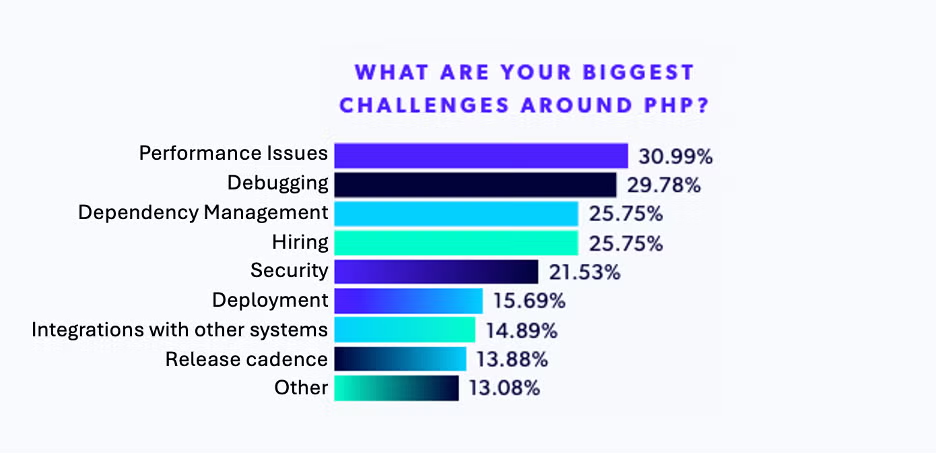
With a combined 61% of participants noting Performance Issues and Debugging as top challenges, it is clear that PHP observability and monitoring practices are important considerations for teams. However, the rest of our data soon revealed a discrepancy between top challenges and leading development priorities.
PHP Observability and Development Priorities
As when we examined ongoing PHP security and compliance trends, we took a look at the top development priorities of PHP teams. As with previous years, Building New Features was named the top priority of 2025 at 43.06% of participants – making it the leading priority for four years and counting. It was followed by Security (42.25%), Improving Code Quality (33.00%), Improving Performance (29.96%), and Deployment Automation/Orchestration (21.13%)
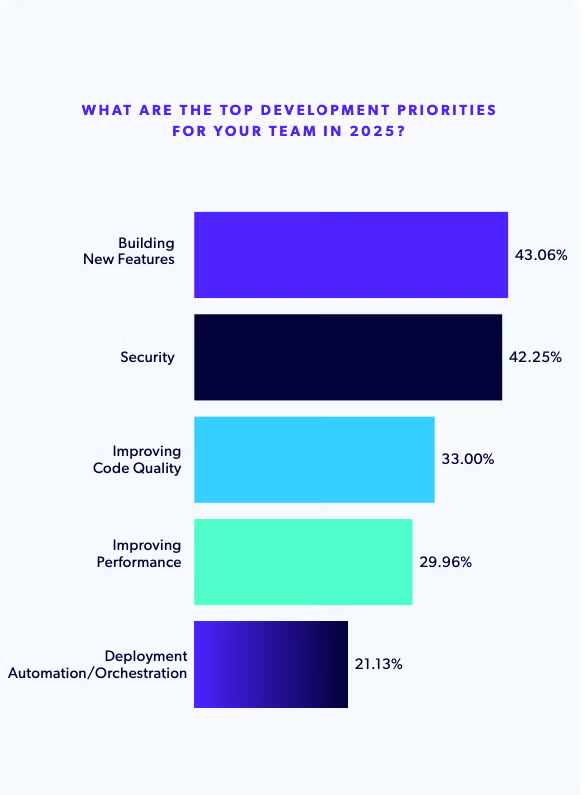
It is interesting to see Improving Performance so low in the rankings, especially when Performance Issues were named the top challenge of the year. It is notable, however, that Improving Performance rose in priority when considering our data year over year, from 18.78% in 2024 to nearly 30% in 2025.
Additionally, Building New Features, Security, and Improving Code Quality can also create performance improvements within applications and could account for the lower ranking of Improving Performance as an individual topic.
Feature Development vs. Maintenance and Administration
To better understand these changing PHP trends, we next asked participants to estimate how much of their team’s time is spent on maintenance and production bug/issue resolution vs. developing new functionalities.
The top selected response was “25% maintenance, 75% new functionalities” at 37.02% of participants. This was followed by “50% maintenance, 50% new functionalities” at 26.76%, “10% maintenance, 90% new functionalities” at 20.12%, “75% maintenance, 25% new functionalities” at 12.27%, and “90% maintenance, 10% new functionalities” at 3.83%.
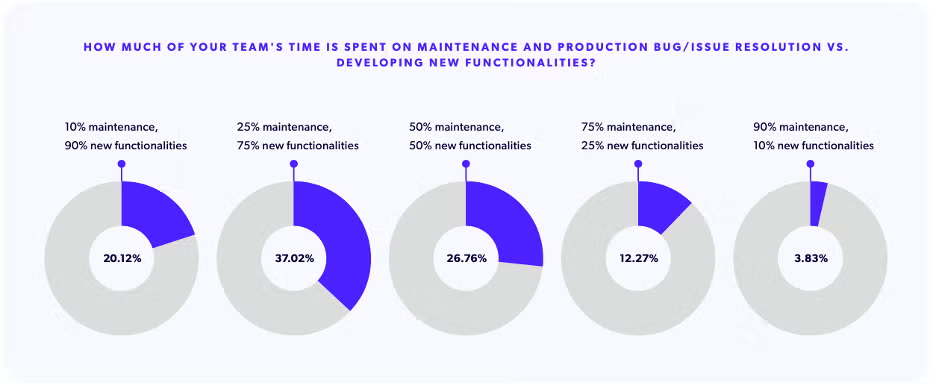
With over half of our surveyed PHP teams spending 25% of their time or less on maintenance, it becomes clear why Performance Issues and Debugging are among the biggest challenges of the year. However, sacrificing maintenance for the sake of developing new features or functionality only produces short term gain and often results in performance issues, expensive downtime, and potential exposure to security threats.
On-Demand Webinar: PHP Observability and Orchestration
ZendHQ provides a comprehensive observability solution for monitoring PHP execution. Join me for this on-demand webinar exploring how the included monitoring features can improve your application.
Time Investment in PHP Application Administration
In a new question on our survey, and to provide deeper insights into how PHP teams are splitting and prioritizing their time, we asked participants how many hours per week on average their team spends in the administration of their PHP applications.
We found that nearly half of respondents reported spending less than 5 hours per week on PHP application administration, followed by 5-10 hours (26.25%), more than 30 hours (9.79%), 11 to 20 hours (8.83%), and teams who outsource their administration (2.14%).
Segmenting by company size, we found that smaller companies with 100 employees or fewer were more likely to spend less than 5 hours per week on application administration compared to companies with over 100 employees, at 50.66% vs. 44.44% of participants.
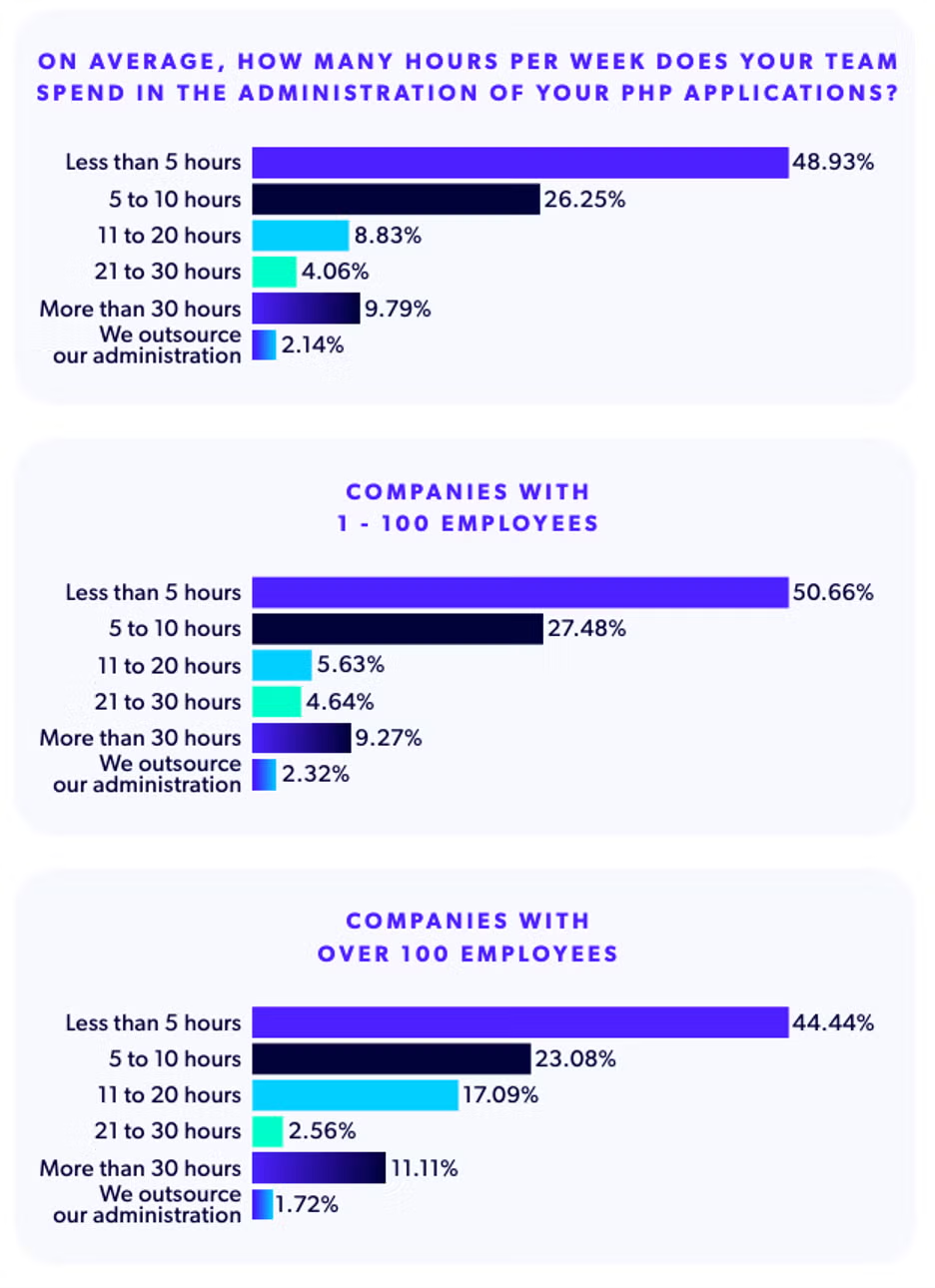
Key Takeaways
PHP is a fantastic choice for delivering business value, allowing developers to keep companies productive while engaging their own customers. For teams spending a significant amount of time on maintenance and administration – while being asked to prioritize new feature development – incorporating monitoring tools or outsourcing administration can help meet demands without hiring additional developers.
With macro conditions in the development space forcing companies to do more with less, we expect to see a rise in PHP observability tooling, which can help teams identify issues before they become problems. We also expect to see a trend toward outsourcing PHP application administration, as doing so will allow developers to focus on creating new features that drive business.
Back to topIdentifying Development Issues
The goal of any PHP observability or monitoring strategy is to identify and address development issues as early as possible. To understand how teams are approaching this process, we asked our participants to identify how they find and resolve production issues within their PHP applications.
The top method was through Log Analysis with 85.28% of teams, followed by Programmatic Checkpoints (68.61%), Debugger Tools (55.63%), Code Tracing (11.47%), and Other (7.36%). Repeated write-in options including ongoing testing, custom alerting systems, and use of tools such as Sentry or Prometheus.
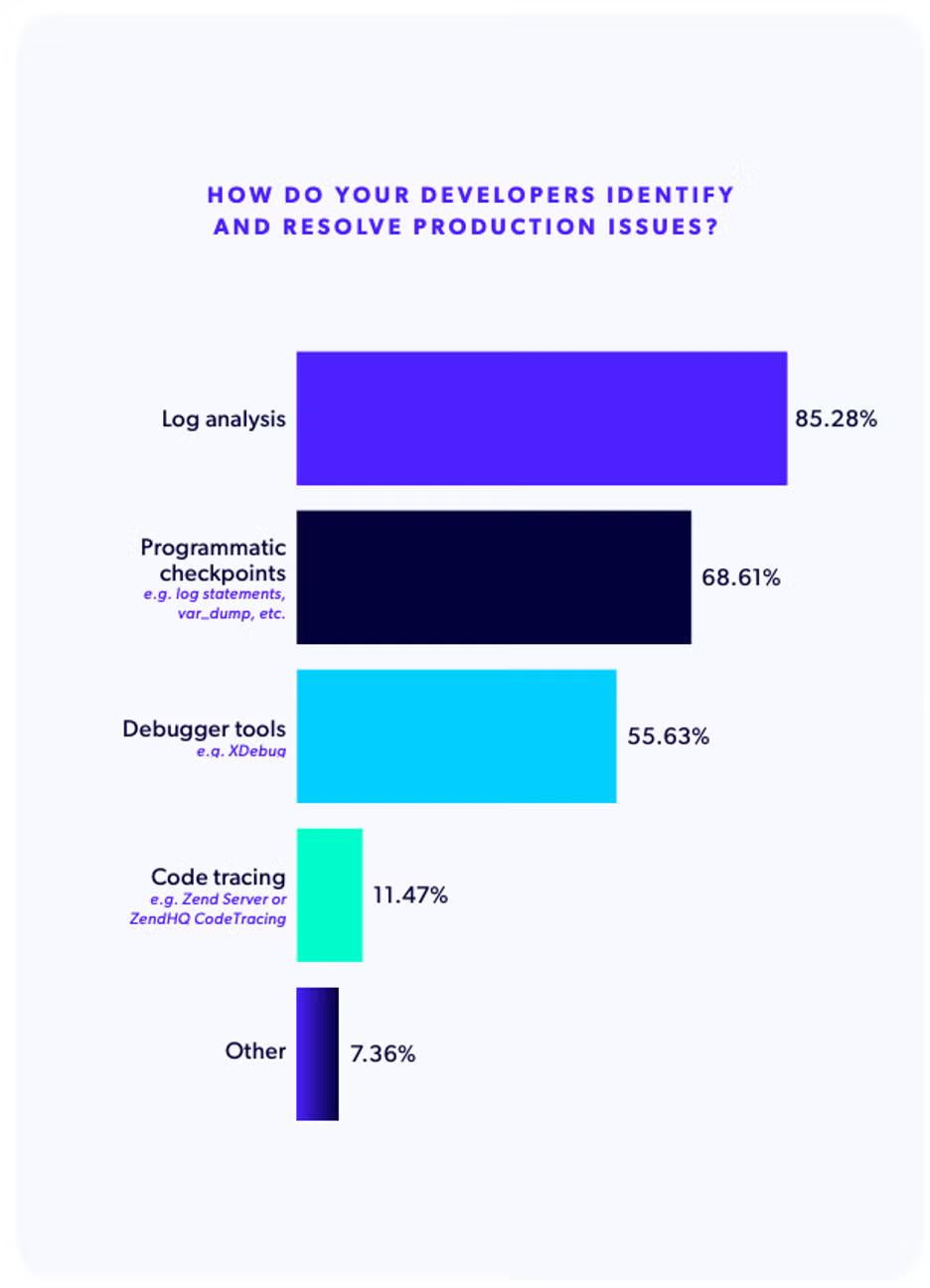
Key Takeaways
Because PHP is used for powering web applications, finding the root cause of production issues can be difficult to trace. Logs can provide pointers, but they often will not contain full context for whatever triggered the log. Additionally, understanding what to log and how to aggregate and interpret log results can require specialized skills.
On the flip side, dedicated debuggers can give this information, but they can also significantly degrade performance and create new issues to address. This makes them a poor fit for production systems.
With the rising sophistication of PHP applications, we expect that PHP users will start to realize immense value from dedicated tools for tracking and monitoring production issues – such as ZendHQ.
Back to topPHP Observability Solutions for Developer Teams
With PHP teams in 2025 spending more time developing new features vs. maintaining or administrating their applications, we were unsurprised to find topics around PHP performance and debugging as top concerns. Additionally, scaling PHP often requires specialized skillsets, as does root cause analysis of production issues.
This means PHP teams must make a choice: continue to sacrifice maintenance and gamble on future issues, implement observability and monitoring tooling, or partner with third-party experts. As I don’t recommend the first option, let’s take a deeper look at the second two.
Implement PHP Observability and Monitoring Tooling
Modern PHP apps are complex, and scaling to meet demand isn’t always as straightforward (or cheap) as teams hope. That’s where ZendHQ comes in. ZendHQ, an extension for ZendPHP secure and supported runtimes, makes it easy for you to monitor, inspect, optimize, automate, secure, and scale your PHP application.
ZendHQ includes many advanced plug-and-play features designed to help your team improve PHP application performance. A few key functionalities include:
- Observability and monitoring tools
- Debugging and code tracing capabilities
- Instant application insights
- Scaling and automation features
- And much more
Outsource PHP Monitoring and Administration
Our survey found that 51.08% of teams spent 10+ hours per week on the administration of PHP applications. That’s a lot of time taken away from building new features to grow your business. One solution is to partner with an experienced and trusted third party, such as Perforce Zend Admin as a Service.
Through our Professional Services, we provide comprehensive monitoring and guidance to take the stress out of PHP application administration. Our global team works hard to keep your PHP runtime updated while providing:
- Continuous performance and health monitoring
- Weekly performance and application health reports
- Scheduled security updates for Zend-managed products
- Support notifications when we detect a problem in your system
- And more!
Learn more about Zend Admin as a Service
Back to topFinal Thoughts
Following and maintaining effective PHP observability and monitoring practices ensures the long-term stability and performance of your mission-critical PHP applications. Looking at our data, many teams are struggling to balance new feature development with the time required for maintenance – yet neglecting observability now can lead to expensive and avoidable issues later.
By leveraging modern tools like ZendPHP + ZendHQ and outsourcing PHP application administration and monitoring, your team can streamline maintenance processes and focus on innovation. Investing in these strategies today will not only improve your application’s performance but also position you for future success.
Try ZendPHP + ZendHQ Free for 21 Days
Ready to see what ZendHQ + ZendPHP can do for your infrastructure? Try both free for 21 days – no commitment required.
